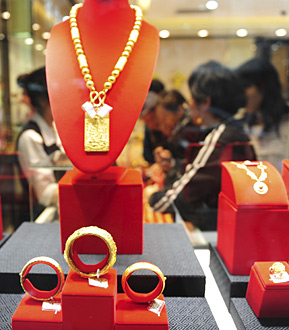|
 |
|
GOLD SLUMP: Gold jewelry for sale at a shop in Qionghai, Hainan Province. Prices of gold futures at the New York Mercantile Exchange fell 2.3 percent on March 15, the deepest daily drop in 10 weeks, as the devastating earthquake and tsunami in Japan triggered panic among investors (MENG ZHONGDE) |
Numbers of the Week
313.6 billion kwh
China's power consumption in February rose 15.82 percent from a year earlier to 313.6 billion kwh, said the National Energy Administration.
856.8 billion yuan
The total assets of the fund managed by China's National Council for Social Security Fund (SSF) reached 856.8 billion yuan ($130.35 billion) at the end of 2010, up 10.32 percent year on year, said Dai Xianglong, Chairman of the SSF.
TO THE POINT: Economic data for February were released, providing insight into the health of the economy. Inflation continues, with the CPI coming in at 4.9 percent, above the government-set cap of 4 percent for this year. Newly extended bank loans fall dramatically as the central bank twists harder on the credit screws. Growth of retail sales slows down in part because the auto market has become lackluster. China Mobile, the world's top telecom operator by subscribers, reports modest growth. After three consecutive months of net selling, China remains the largest foreign holder of U.S. Treasury securities.
By HU YUE
February Figures
CPI, PPI
The consumer price index (CPI), a barometer for inflation, rose 4.9 percent in February from a year ago, the same rate as in January, said the National Bureau of Statistics (NBS).
The index was higher than expected given a series of government measures to rein in inflation. The CPI was driven up largely by food prices, which skyrocketed 11 percent year on year due to the impact of the Spring Festival which fell on February 3, said Sheng Laiyun, NBS spokesman.
Meanwhile, the lagging effect of monetary expansion in developed countries also provided some tailwinds for inflation in China, he said.
The producer price index (PPI), a major measure of inflation at the wholesale level, went up 7.2 percent in February from a year ago, the highest level since October 2008.
Zuo Xiaolei, chief economist of China Galaxy Securities Co. Ltd., said rising global commodities prices pushed up the PPI, which in turn would feed into the consumer inflation.
But China is still able to meet the government's goal of keeping CPI growth at 4 percent this year, said Ma Jiantang, Commissioner of the NBS.
"After seven consecutive years of bumper harvest, the country has plenty of grain reserves at its disposal to stabilize food prices," he said. "Industrial overcapacity in some sectors will also help hold serious inflation at bay."
Bank lending
New loans denominated in the yuan totaled 535.6 billion yuan ($81.52 billion) in February, compared with 1.04 trillion yuan ($158.1 billion) in January, said the People's Bank of China, the central bank.
"China's quantitative tightening is working," said Qu Hongbin, China economist with HSBC in Hong Kong. "Combined with supply-side measures aiming at cooling food price inflation and mitigating the impact of oil prices, this implies that inflation is likely to peter out by the middle of the year."
"Rapidly falling lending and money growth is one of the major reasons why we believe China's inflation won't be out of control," said Lu Ting, a Bank of America-Merrill Lynch economist.
The government may delay further tightening measures, including an increase in interest rates because of "uncertainty" caused by the earthquake in Japan, he said.
The central bank has raised interest rates three times and the reserve requirement ratio eight times since last year.
Investment
China's urban fixed-asset investments in the first two months went up 24.9 percent year on year to reach 1.74 trillion yuan ($264 billion). The investments in property development totaled 425 billion yuan ($65.4 billion) in January and February, up 35.2 percent from the same period of last year.
Retail sales
China's retail sales of consumer goods stood at 2.9 trillion yuan ($441.4 billion) in the first two months of 2011, soaring 15.8 percent from the same period last year. The growth rate, however, was 3.3 percentage points lower than in December 2010.
The consumer market languished in part because a gloomy property sector put a lid on consumptions of construction materials and furniture, said Shen Minggao, chief economist at Citigroup, Greater China.
In addition, the auto market has lost some shine as February sales grew a minuscule 4.57 percent year on year, compared with 46 percent in the same period last year, said Li Xunlei, chief economist at the Guotai & Jun'an Securities Co. Ltd.
In another move, the central bank recently conducted a survey of over 20,000 households in 50 cities. Only 14.2 percent of the respondents said they would spend more, the lowest in 12 years. About 44.2 percent preferred to invest while 41.6 percent said they would rather save more.
Money supply
The broad money supply (M2), which covers cash in circulation and all deposits, increased 15.7 percent year on year to 73.61 trillion yuan ($11.3 trillion) at the end of February, said the central bank.
Fiscal revenue
Fiscal revenues jumped 41.5 percent year on year in February to 699.7 billion yuan ($106.5 billion), said the Ministry of Finance.
FDI
China received $7.8 billion in foreign direct investment (FDI) in February, surging 32.2 percent from one year earlier, said the Ministry of Commerce (MOFCOM). But the figure was less than January's $10.02 billion.
A total of 1,156 foreign-funded enterprises were approved in February, down 10.9 percent year on year.
| 